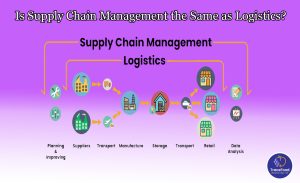Supply chain management and logistics are sometimes used synonymously. Some claim that there is no distinction between the two concepts and that supply chain management is the “new” logistics.
Logistics
Logistics management is the management process that incorporates the flow of capital, information, services, and goods from the procurement of raw materials till they reach their final customer. The goal of this procedure is to give the final consumer the correct product of the right quality at the proper time, location, and cost. Two major categories can be used to classify the logistical activities.
Inbound Logistics:
The tasks involved in material procurement, handling, storage, and transportation
Outbound Logistics:
The processes involved in the collection, maintenance, distribution, or delivery to the final consumer.
Supply chain management
Besides these, other activities include stock control, balancing supply and demand, fulfilling orders, protective packing, and warehousing. High-quality items will be produced, as well as cost and time savings.
Supply Chain Management (SCM) is a group of related tasks. W are moved from raw materials to finished items and back again until they are delivered to the customer. Multiple groups worked together to make this chain of activities successful, and that success is the result of their combined efforts.
These organizations could be the businesses that the company now collaborates with as suppliers or partners, as well as producers, distributors, retailers, and customers. Integration, sourcing, procurement, production, testing, logistics, customer services, performance assessment, etc. may be among the activities.
With a focus only on the needs of the customer, supply chain management uses a multi-faceted approach to control the flow of raw materials, works in progress (semi-finished goods), and finished goods both inside and outside the organisation until they are received by the final consumer.
Exactly how similar are supply chain management and logistics?
Even though the two are related ideas, they differ greatly from one another.
Transporting, storing, and delivering commodities are all elements of supply chain management. In other words, logistics is in charge of delivering the appropriate goods to the appropriate customer at the appropriate time.
All activities involved in moving goods and services from production to consumption fall under the umbrella of supply chain management, which is a more general word. It covers every step of the production and distribution of commodities, from sourcing and acquisition to their manufacturing.
Firstly, to make sure that your organisation is operating smoothly and effectively, it is crucial to understand the main distinction between supply chain management and logistics. With this knowledge, you can create customized strategies for each sector and make sure your entire business functions flawlessly.

How does blockchain provide supply chain solutions?
Through the use of blockchain technology, businesses can track all kinds of transactions more securely and openly. On the supply chain function, there might be a huge influence.
Businesses are now able to follow a product’s history from its point of origin to its present location using blockchain technology. A permanent history is create from the point of manufacture. To the point of sale for every time a product is sale by securely documenting the transaction.
The time delays, additional costs, and human error that are usually connect to transactions might be significantly reduce with the use of this potent technology if parties work together on a single shared platform. The absence of middlemen in the supply chain also lowers the possibility of fraud. Furthermore, complete records make it easier for firms to pinpoint the origin of fraud, wherever it may occur.
A shared blockchain ledger provides a trustworthy and uncrackable audit trail of the transfer of information, stock, and money along a supply chain. Businesses may synchronize logistical data, track shipments, and automate payments using a common blockchain. They can share only the most pertinent data while doing so without substantially changing their legacy systems.
Development of supply chain management
The term “logistics” has a long history and was first used in the military. For describe the upkeep, storage, and transit of military personnel and equipment. After the development of the idea of supply chain management, this phrase is now use widely and not just in the military. Additionally, it has been claime that SCM includes logistics in addition to being an addition to logistics management. They couldnt separate. As a result, they are complementary rather than in conflict. SCM enables Logistics to communicate with the team in charge of transportation, storage, and distribution.
Tracefood offers the ideal way to collect data from supply chains. It is simple to subscribe to and donate to tracefood thanks to ready-made blockchain applications. Companies can also restrict users’ access to information using these tools. This allows for the privacy of sensitive information while only sharing essential information with other supply chain participants. The blockchain receives bundled data from IoT sensors, shop floor systems, and other devices via secure cloud gateways.
Improve inventory holdings, reduce trading fees, fraud prevention, and other benefits can all be attain through greater transparency and a higher level of traceability.
With innovative blockchain solutions created by top blockchain developers, Trace Food enables seamless and efficient control of the food supply chain. With the use of our cutting-edge Blockchain deliverables, we aim to create new paradigms for the fresh produce business.